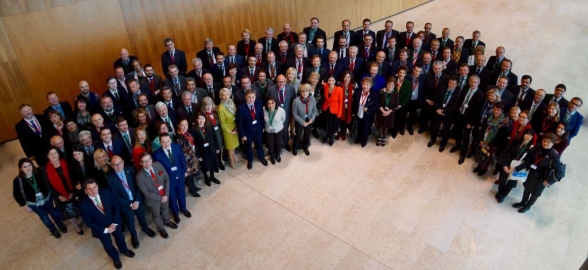Day two of the COSAC Plenary Meeting held in Luxembourg was marked by discussion on the EU enlargement policy. Speakers in the introductory part of the session were: Mr Simon Mordue, Director “Strategy and Turkey”, DG NEAR, European Commission, Mr Kamal Izidor Shaker, Chairman of the Committee on EU Affairs of the Drzavni zbor of Slovenia, and Mr Gunther Krichbaum, Chairman of the Committee on EU Affairs of the German Bundestag.
The parliamentarians were given a presentation of the new approach of the European Commission, where for the first time they adopted a single enlargement policy which would be in force for the duration of the entire mandate of the incumbent Commission. As of this year, the manner of reporting on progress in countries of the Western Balkans and Turkey has also been changed; the reports represent a critical overview of state of affairs and degree of readiness to undertake membership commitments within each negotiation chapter. The new manner of reporting is more systematic and provides strategic guidelines for further progress to countries in the accession process, thus affirming the European Commission’s dedication to the enlargement policy. The year 2016 was estimated as a very ambitious year for all countries, which are expected to show commitment to comprehensive implementation of the necessary reforms.
In the brief overview for each of the countries, it was estimated that Montenegro had achieved visible progress through strengthening of its legislative and institutional framework. In the upcoming period it is key to achieve concrete results in implementing legislation, which would determine the overall pace of negotiations. The European Commission welcomed the opening of negotiations with Serbia by the end of this year. Macedonia is expected to implement the achieved agreement of political parties and concrete reforms, and Albania to achieve further progress in the field of the rule of law, especially in the fields of judiciary, corruption, human and property rights. The long awaited progress has been achieved in Bosnia and Herzegovina, for which Stabilisation and Association Agreement entered into force; this type of agreement has also been signed for Kosovo, for which the imperative task should be resolving the issue of political deadlock. Serbia and Kosovo are expected to achieve further progress in normalising their relations, as well as to achieve and implement key mutual agreements. The EU is cooperating with Turkey in resolving the refugee crisis, combating terrorism, in the field of energy and commerce; still, Turkey has not achieved concrete progress in the field of the rule of law and protection of human rights, with constantly present intimidation of and pressure on the media.
The interlocutors reminded that the Western Balkans countries should have an emphasised EU perspective and that the EU should be committed to promises from the Thessaloniki Agenda. The number of opened chapters should not matter in negotiations, but the quality of implemented reforms; likewise, the speed is not important, but the comprehensiveness of negotiations; therefore it is a good practice to open the hardest two chapters in the beginning, which would condition the entire pace of negotiations. It was emphasised that the enlargement policy and the neighbourhood policy should complement each other, because one of the ultimate goals is to have no tension nor instability at the EU borders.
The enlargement policy started very ambitiously in 2004; after that there was enlargement fatigue in the EU, while now the pause in enlargement until 2020 was announced. Regardless, enlargement should continue to be one of the most successful EU policies, because it opens the EU horizons and promotes its fundamental values and goals. The criteria and rules are clear, thus making the process more transparent and just. The accession process is the strongest instrument for transformation of countries and strengthening of the security of the entire region.
In her address, member of the Committee on European Integration Ms Azra Jasavić referred to Montenegro’s progress achieved since the beginning of negotiations on the EU accession, and talked about future challenges and priorities in implementing reforms in accordance with recommendations of the European Commission. She pointed out that Montenegro was aware that the accession was a strict, but fair process in which all the set criteria must be met, as well as that it was aware of responsibilities and commitments of all parts of society in this process. She also stated Montenegro’s commitment to regional initiatives, because only through good neighbourly relations and cooperation could the full potential of the region be achieved.
The COSAC Plenary Meeting ended with adoption of joint conclusions.









